There are many games about fighting Nazis. Or robot Nazis. Or zombie Nazis. Maybe you prefer pseudo-space Nazis. But not so many games about fighting Nazism. Through the Darkest of Times dispenses with the typical power fantasy in order to tell a historically grounded story about what happens when the entire society around you falls under the iron grip of fascism and asks: How far are you willing to go to stop it? It does so by taking the action away from the battlefields and onto the streets, focusing on the ordinary Germans who took it upon themselves to resist Hitler’s regime from the inside.
In Through the Darkest of Times, you are one such dissenting German who must organize a resistance cell in the face of increasing oppression. It’s kind of a hybrid game. The core gameplay is strategic — planning activities that start with gathering information and spreading sedition to risky acts of sabotage. You must carefully manage human and material resources against attrition. Narrative segments also break up the action. These text-and-picture-based events show your character interacting with different aspects of life (and death) under the Nazi regime throughout its history.
The muted and cartoonish art style is based on the work of Otto Dix and Käthe Kollwitz, two artists labeled “degenerate” by the Nazi authorities. Similarly forbidden jazz and swing music plays in the background of your hideout. The stage is set for resistance. With smart choices and no small amount of luck, your ragtag group of malcontents may just make it Through the Darkest of Times. Maybe they’ll even do some damage on the way. If you don’t do so well… this game isn’t joking about being dark.
Anti-fascist allies
Profession, politics, and abilities define your main character and core team. For example, Valentin Kraft: journalist, anarchist, four points in secrecy, three points in empathy, two points in propaganda and book-learning. But your next recruit could be a working-class welder conservative Christian with a strong arm but poor education — and a criminal past that just happens to come in handy for more underhand resistance activities. Different agents have higher chances of success at different tasks. Meeting trade union leaders is easier when your agent is working-class and perhaps also a communist, but such an individual wouldn’t do so well recruiting from Christian groups or contacting liberal academics or businessmen.
The diverse political affiliations make it likely that you’ll run with a motley crew. It’s possible for a communist, monarchist, catholic conservative, and social democrat to all end up working together under an anarchist or liberal Christian leader, for example. This reminds players that opposition to Hitler was not a simple left-right issue, but that a broad spectrum of people resisted Nazism’s inhumanity. Throughout the game, the characters will offer opinions on recent events, colored by their beliefs.
The narrative sections between missions flesh your foot soldiers out some more. As the resistance leader, you may well have to mediate conflicts between your members or decide whether to spare mission resources to help them in times of need. Perhaps one member suspects another of being a Gestapo informant. Maybe one hopes Germany will lose the war, drawing the ire of more nationalistic members. Someone can have trouble with their family or need some financial support. These segments effectively humanize your team, making you think twice before you send them into danger.
Risk it for resistance
Your core members are your most important resources in Through the Darkest of Times. The strategic layer consists of deciding which missions are worth the risk of getting them caught. Unlike, say, Warsaw, this isn’t skirmish game, but more of a management sim. Each turn you look over a simplified map of Berlin and assign your agents to different tasks. Some tasks reward you with items, such as a uniform for disguise, or intel on the regime’s atrocities you can smuggle to the outside world. Others could gain useful contacts. Missions can unlock other, more spectacular ones — but due to the rather unclear indications of how this works, it’s unlikely to complete many, or any, of these in each 20-turn chapter.
The consequences of failure can be dire. Simply being noticed is not so bad but increases danger for future missions. When things really go south, then injury, imprisonment, or death is possible. RNG plays a big role here — a run of bad “rolls” can spell doom for an entire chapter. In the end, the only goal is survival. Your group will disband if it runs out of morale. This is always decreasing by default, as does the number of supporters. It’s tough to get anything done. It feels like the odds are always stacked against you, and that’s completely appropriate.
Unfortunately, the atmosphere is let down by game elements that are quite frustrating or confusing. I found it often unclear how to progress through mission chains or how various items worked. With strict turn limits between chapters, it frequently felt like critical information came too late to act on it. One could replay with this foreknowledge and try for an “optimized” playthrough, but the core missions necessary to keep the resistance alive are very repetitive. Progress is reset between each chapter, and time is too precious to spend figuring out opaque mechanics.
A harsh history lesson
History weighs heavily on Through the Darkest of Times. The game’s sensitive and unflinching look at the horrors of the Third Reich is its greatest strength. The story is broken up into chapters that each highlight important aspects of history: Hitler’s rise to power in the Weimar Republic and suppression of opposition following the Reichstag fire. The ramping up of the propaganda machine and totalitarian state. The visage of progress presented to the world during the 1936 Olympic Games. The outbreak of war. The escalation of oppression and the rounding up of gypsies and Jews into the concentration camps. The desperation of the Volkssturm — the old men and boys pressed to serve as roadblocks for Soviet tanks.
History unfolds via newspaper headlines and story vignettes where you can make a few choices. Your character will be present for large-scale historical events such as rallies and even a trip on the Hindenburg zeppelin. But the most powerful scenes are the personal stories. What will you do when you see a Jew getting beaten up on the streets? What do you say to your neighbor, whose child is being brainwashed by the Hitler Youth? In the end, your decisions mean little mechanically, being more a tool for immersion in the narrative than anything else.
Through the Darkest of Times certainly has educational as well as artistic value. This has earned it the distinction of being the first game to be allowed to display swastikas in the German market. You can turn this off in the options menu if you don’t want to see them. For developer Paintbucket Games, the story of the anti-Nazi resistance has something to teach us today, and both the German and English versions have occasional nods to contemporary politics. Whatever you think about that, I wouldn’t dismiss the game out of hand. Its story is relevant for everyone.
Holding on to humanity
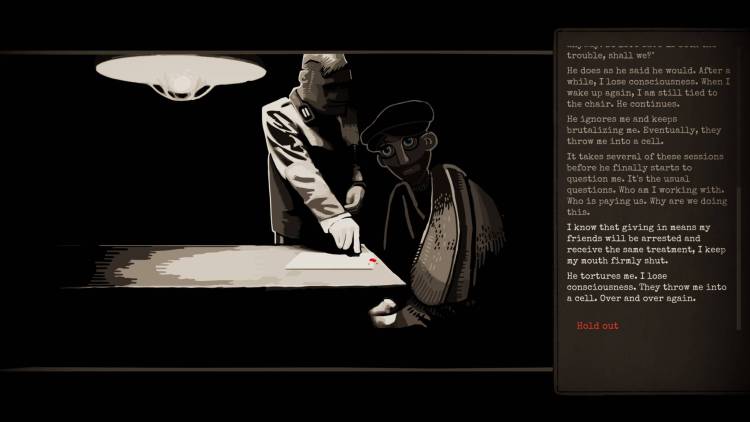
Even with simple graphics and text, you can experience harrowing moments in Through the Darkest of Times.
What Through the Darkest of Times does best is present a story of humanity persevering against overwhelming odds. The actions of your little rag-tag group may not pull off big, dramatic victories. But the sum of your small acts of kindness and bravery can be meaningful to the ordinary people around you, even if at times you still do your best and it’s not good enough to stop evil from happening. The mere existence of opposition defies the regime of fear the Nazis want to impose. They will impose it ruthlessly. In the end, your survivors will ask if they did enough and it if was worth the sacrifice.
Through the Darkest of Times is absolutely a special game, for its focus on a neglected aspect of history and its genuine message of humanity. I can recommend it to anyone interested in WWII, Nazi Germany, or authoritarian societies in general. It’ll be worthwhile. The game has a unique perspective, and the writing packs an emotional punch. There’s a horror to being in the Gestapo interrogation room or seeing the ranks of your neighbors close in to dismiss atrocities that can’t be matched by anything Resident Evil or Doom has to offer.
But as a strategy game, it’s too linear, too limited, and too repetitive to stand out. Maybe its subject matter can’t really be made “fun” while still honoring history. I’m glad that I played Through the Darkest of Times and experienced its message. But I’m in no hurry to go through it again.

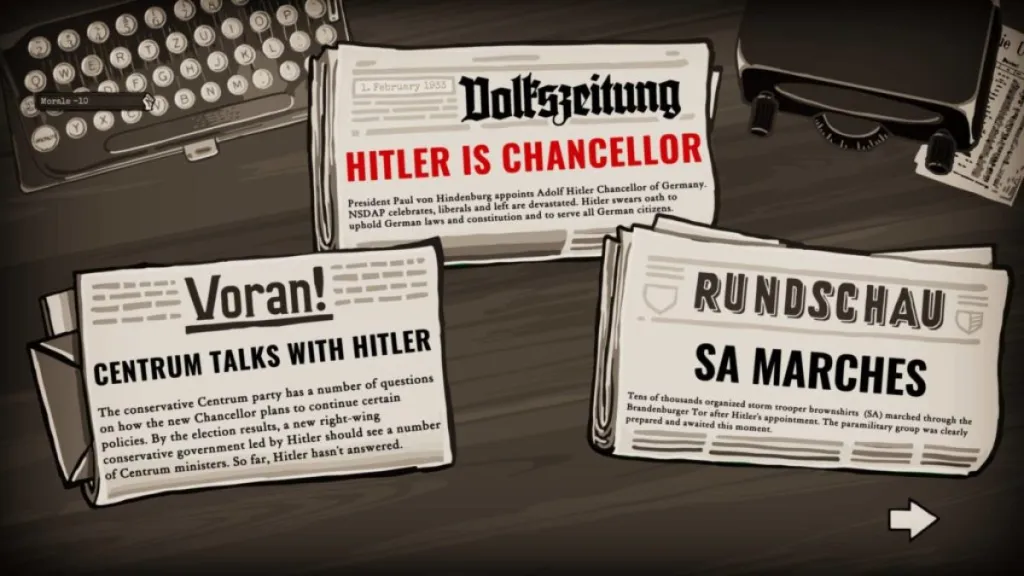
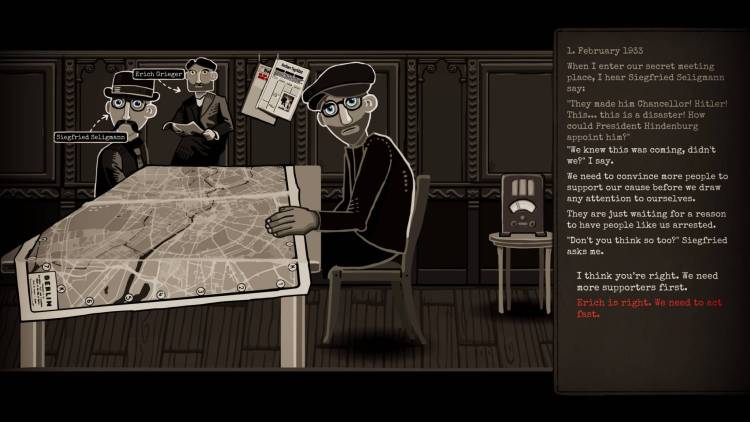
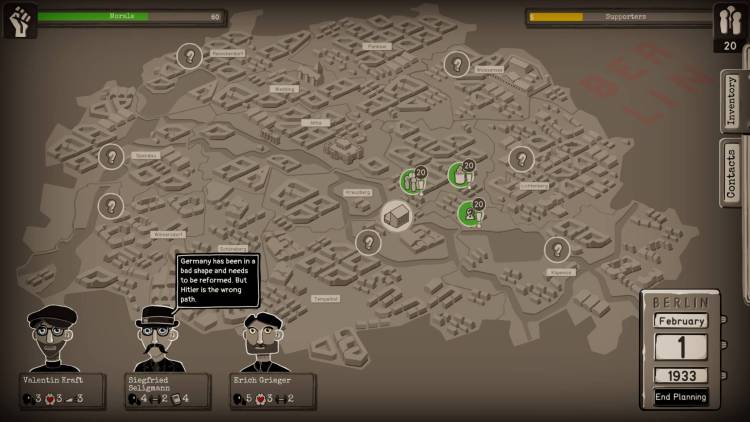
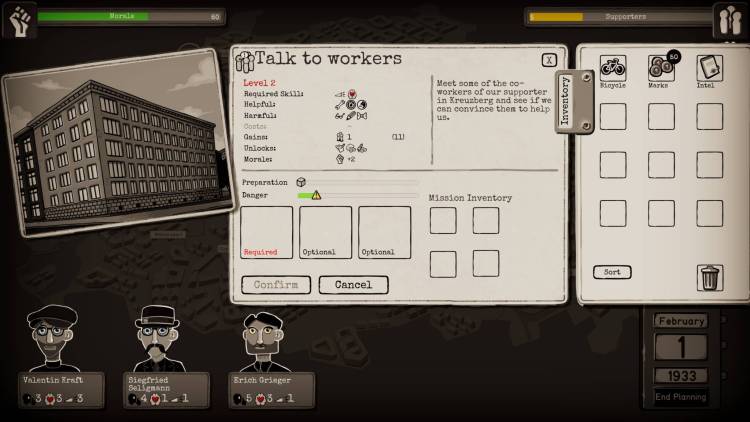
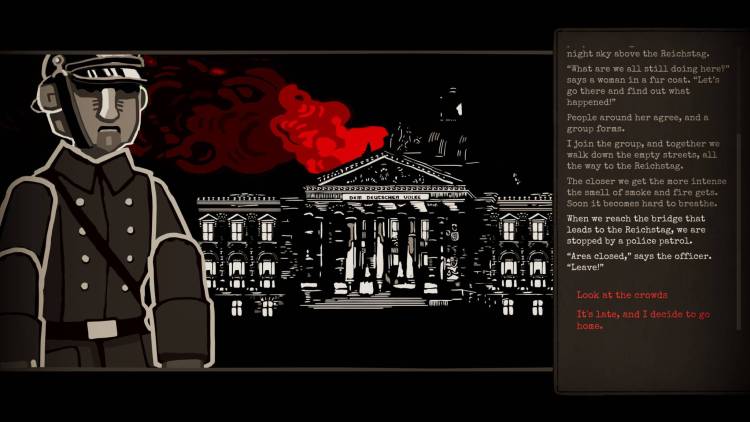
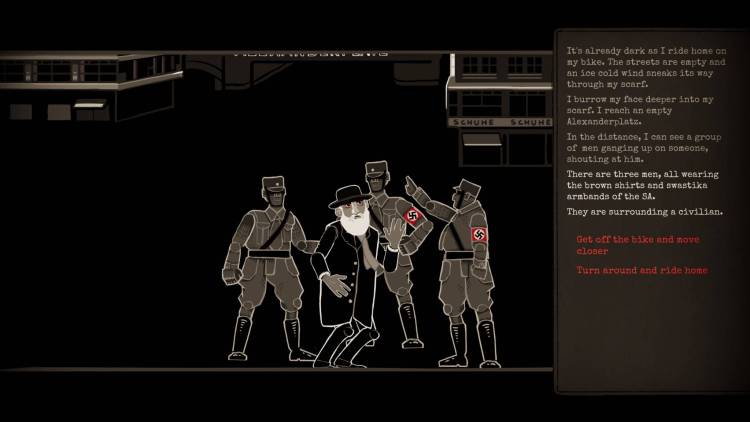





Published: Feb 6, 2020 03:00 pm